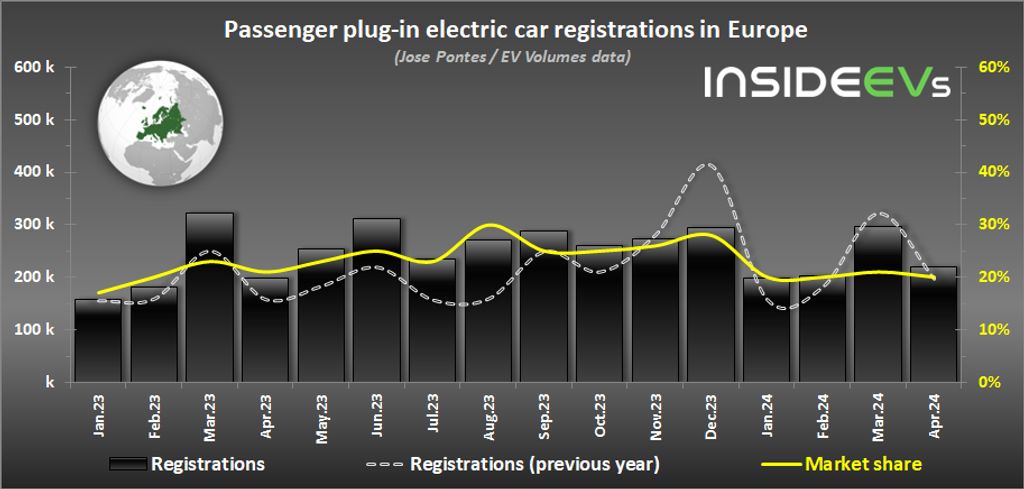In April, plug-in electric car sales in Europe increased by 11% year-over-year. This slight growth is a positive sign in a challenging market, although the overall market expanded faster.
According to EV Volumes data, shared by researcher Jose Pontes, almost 220,000 new plug-in electric cars were registered in Europe in April. The market share amounted to roughly 20% (compared to 21% a year ago).
A flat year in progress
After the first four months of the year, it seems that 2024 will be a flat year in Europe. Plug-in electric sales are only slightly higher than in the same period in 2023.
All-electric car registrations account for about 13% of the market (over 140,000 units), while plug-in hybrid registrations account for about 7% of the market.
Together, plug-in electric cars hold 20% of the market, while non-rechargeable hybrids impressive 30% for a total of 50% for electrified models (EVs, PHEVs, and HEVs). According to the report, hybrids are also the fastest growing segment, with a 29% year-over-year in April.
Plug-in car registrations for the month (YOY change):
- BEVs: about *143,000 (up 17%) and 13% market share
- PHEVs: about *77,000 (up 2%) and 7% market share
- Total: 219,770 (up 11%) and 20% market share
* Estimated from the market share
Over 920,000 passenger plug-in electric cars were registered in Europe during the first four months of the year, about 21% of the total market.
Plug-in car registrations in January-April (YOY change):
- BEVs: about *0.59 million and 13% market share
- PHEVs: about *0.33 million and 8% market share
- Total: 923,171 (up 6%) and 21% market share
* Estimated from the market share
For reference, over 3 million passenger plug-in electric cars were registered in Europe in 2023, 16% more than in 2022. The market share amounted to 24% (compared to 23% in 2022, 19% in 2021, and 11% in 2020).

The Tesla Model Y remains Europe’s best-selling plug-in model, with 9,489 new registrations in April—however, the model’s result weakened by 11% year over year.
At the same time, the all-new Volvo EX30 continued to expand, reaching a new record of 8,672 units, which is very close to the Tesla Model Y.
Interesting is also the return of the Volkswagen ID.4 to the podium in April with 6,011 units—a hundred more than the Audi Q4 e-tron.
Results for the month:
- Tesla Model Y – 9,489
- Volvo EX30 – 8,672
- Volkswagen ID.4 – 6,011
- Audi Q4 e-tron – 5,909
- Volvo XC60 PHEV – 5,183
- Volkswagen ID.3 – 5,157
- BMW iX1 – 4,506
- Tesla Model 3 – 4,482
- Skoda Enyaq iV – 4,359
- BMW i4 – 4,309
After the first four months of the year, two Tesla models are at the top, but the Tesla Model 3 is losing ground and might be outpaced by the surging Volvo EX30 in the later part of the year.
Results in January-April 2024:
- Tesla Model Y – 67,560
- Tesla Model 3 – 31,731
- Volvo EX30 – 22,283
- Audi Q4 e-tron – 21,443
- Volvo XC60 PHEV – 19,280
- Volvo XC40 – 19,131 (18,073 BEVs + 1,058 PHEVs)
- Peugeot e-208 – 18,828
- Skoda Enyaq iV – 18,162
- MG 4 – 17,668
- BMW i4 – 16,684
Tesla was the most popular brand in the plug-in car segment during the first four months of the year, but the differences between the top four brands are relatively small.
In terms of automotive groups, the Volkswagen Group, with a 20% share, is the lone leader. It is followed by Stellantis (13.2%), which outpaced Tesla (10.8%). Meanwhile, Tesla has to watch its back because the BMW Group and Geely-Volvo are right behind it.
Top brands by share in the plug-in segment in January-April:
- Tesla – 10.8%
- BMW – 10.3%
- Mercedes-Benz – 9.4%
- Volvo – 8.6%
- Audi – 6.8%
- Volkswagen – 6.4%
- Peugeot – 5.4%
Top automotive groups by share in the plug-in segment in January-April:
- Volkswagen Group – 20.2%
- Stellantis – 13.2%
- Tesla – 10.8%
- BMW Group – 10.8%
- Geely-Volvo – 10.4%
- Mercedes-Benz Group – 9.9%
- Hyundai Motor Group – 8.2%
Read the full article here



